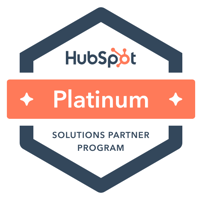In the information below, we'll break down several of the key differences between these two platforms.

HubSpot vs. Microsoft Dynamics: An Overview
What is HubSpot Sales Hub?
Sales Hub is a platform built within HubSpot's all-in-one CRM system. It helps sales teams to engage with customers in a streamlined, data-driven way, and thus save time and increase revenue.
What Is Dynamics 365 Sales?
Dynamic 365 Sales is a sales CRM platform that combines robust automation and customization capabilities with context-driven analytics that help salespeople to engage with prospects in a more effective way.
Pricing Differences
What does HubSpot cost, and which features does it offer?
Note: Here we are comparing 50 user license and Enterprise Levels. HubSpot CRM Starter is also available for two users at $25 each. Or Professional for 5 users at $100 each.
HubSpot's list price is $6,000 per month for 50 paid users, with a $120/month surcharge for each additional paid user. It also offers a flat rate of $3,000 for Enterprise onboarding.
It comes with all of its advertised features built-in. Free seats are available for stakeholders who don't need to utilize the sales tools but only require visibility into business operations.
The estimated total cost of HubSpot CRM each year for a team of 50 is $75,000.
What does Microsoft Dynamics cost, and which features does it offer?
Dynamics has a list price of $4,750 per month for 50 paid users, and then a variable monthly surcharge (from $95 to $135) for each additional user. It also comes with a $15,000 Sales App implementation fee, plus $1,000 for administrator training.
In order to access all of Microsoft Dynamics' features, you would need to pay for add-ons. Even enabling your reps to use a shared inbox would cost additional money.
The estimated total cost of Dynamics each year for a team of 50 is $98,000.
Let's Talk About Power
HubSpot's CRM combines consumer-grade ease of use with the robustness of an enterprise-level platform. It offers a wide range of powerful CRM capabilities, including:
- Sales automation
- Sales and marketing analytics
- Pipeline management
- Contact management
- Lead scoring
- Custom objects
- Etc.
Microsoft Dynamics offers a similar set of powerful features, including forecasting, CPQ, and much more. Note that in order to access the full suite of features from LinkedIn Sales Navigator, as well as contextual insights such as predictive scoring and pipeline forecasting, you'll have to buy add-ons that integrate with the platform.
Their All-in-One Functionality
HubSpot and Microsoft Dynamics are both "all-in-one" CRM platforms. However, there are key differences between the two systems.
HubSpot's platform has been "built from scratch" in terms of coding and experiential consistency. In practical terms, that means its user experience remains virtually the same across different tools and functions. This is a big advantage for both brand-new users and users who must work across diverse departments.
Microsoft Dynamics' all-in-one platform offers a wider range of products, covering key business aspects such as marketing, sales, customer service, field service, and many more. However, Dynamics comes with a much higher learning curve than HubSpot, especially if you're not already a Microsoft 365 user. If you are, then you may find Dynamics to be a good match in this area, since it fits seamlessly into the Microsoft 365 ecosystem.
Ease of Use
HubSpot has a sterling reputation for its user-friendliness. In fact, PC Mag has described HubSpot as "straightforward to set up and use, with plans to fit every budget."
It has a high rate of "rep adoption" (i.e., the number of sales reps who are willing and able to use the CRM), and clients who use HubSpot frequently see a marked improvement in their data quality as a result.
Microsoft Dynamics has powerful CRM, analytics, and reporting features that can fit just about any business need. However, the customization process can be time-consuming and may require intensive training in order to achieve mastery. Another option is to hire a dedicated, experienced admin to customize the tools in a way that aligns with your sales process.
In the end, Dynamics has a slight edge in terms of raw customization power. But HubSpot pulls ahead when it comes to usability.
Scalability and Customization
HubSpot's platform offers built-in flexibility that enables users to add more and more layers of customization as their business grows. This makes it an excellent choice for a company that needs to scale up as it acquires more customers and expands its market presence.
Microsoft Dynamics offers a vast spectrum of customization features for large, enterprise-level organizations. Complex business needs can be addressed via tools like PowerApps, such as the consolidation of detailed production and manufacturing data. However, Microsoft's basic list price for Dynamics does not include such specialized tools and must be bought separately.
The Integrations
HubSpot's App Marketplace includes 500+ apps and integrations that you can include in your sales process. Many of these apps are native to HubSpot and thus fit seamlessly into its larger ecosystem.
The Dynamics Connectors Library also boasts several hundred apps and integrations for use with Microsoft's CRM. In addition, users have access to flow templates that help them to combine multiple integrations in order to run a specific process.
Ultimately, both HubSpot and Microsoft Dynamics offer exceptional capabilities in terms of robust integrations.

The Verdict?
At the end of the day, both HubSpot and Microsoft Dynamics are well-designed, powerful, and flexible CRM platforms. In general, Dynamics is more suitable for large, sophisticated corporations that need to handle complicated processes on a daily basis (and are willing to pay more to make that happen). On the other hand, HubSpot is often the go-to choice for SMBs and business organizations that need a robust CRM solution that is more user friendly and has a higher adoption rate amongst salespeople.
If you'd like to learn more about the differences between HubSpot and Dynamics, and which one you should choose for your business, reach out to our team of CRM experts at OverGo Studio today for a free consultation. We're glad to answer any questions you may have!
Take advantage of our free Hubspot CRM Configuration to start modernizing your sales process. This is a limited-time offer where we will design a sales pipeline specifically for your business. Start generating more revenue and improve your close rates by building your first high-performing sales pipeline on HubSpot at no cost. Simply schedule a discovery session with our team of HubSpot experts.


